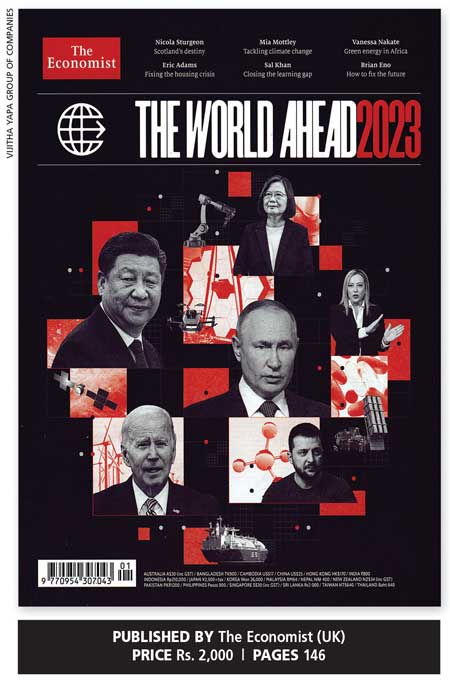BOOKRACK
Predictions for 2023, published by The Economist, are awaited by a host of readers including world leaders. Indeed, the journal is a leading authority on money matters, politics and world issues.
Events in Asia take centre stage in the latest edition.
In Indonesia, the election of President Joko Widodo brought hope for democracy. But of late, he has begun work on relocating the nation’s capital from Jakarta to Nusantara, to the east of Borneo.
What this will mean to the rainforest in Borneo isn’t known – although the plan is to turn it into the world’s greenest city. It’s expected to be completed in 2045 and cost around US$ 29 billion.
Construction of airports, ports and toll roads have taken prominence, and Nusantara will be three times the size of Singapore. Eighty percent of the cost is expected to be met by foreign investors but not much of it has materialised.
A worrying factor is that former army officer Prabowo Subianto is expected to contest the 2024 presidential election. He is a prominent figure and ex-son-in-law of former President Suharto, who ruled for 30 years. Subianto is keen to reverse the current policy of decentralisation.
Though iconic Aung San Suu Kyi’s election victory was hailed as a sign of democracy in Myanmar, its military wasn’t convinced.
And President Ferdinand Marcos was ousted by people power; but today, his son Bongbong Marcos is the President of the Philippines.
The Economist notes that climate change remains a major threat and the greatest forces on the planet continue to remain outside human control. We’re sending probes far out into the solar system and even private enterprise has attempted space exploration.
We can still blow ourselves to smithereens with weapons of mass destruction. And the war between Russia and Ukraine is inching towards a terrifying end. What effect this will have on Europe and the world is unthinkable.
Beijing is exerting its influence in the South China Sea and surrounding islands, and China’s plans for Taiwan are being analysed in detail. The US is being stretched to its limit; although compared to Europe, America’s energy needs are being met at home.
North Korea continues its aggression by firing missiles at will, and the impact of these weapons on neighbours such as Japan and South Korea are also being analysed.
President Xi Jinping has strengthened his hold on China with an unprecedented third term. But his ‘zero COVID’ policy – with local lockdowns and quarantine, rather than using imported vaccines (as most countries have done) – is taking a toll on the Chinese people.
China Editor of The Economist Roger McShane says Xi wants to reshape the world and present China’s authoritarian model as a plausible alternative to that of the West. Xi wants more say in how businesses are run, resulting in slowing down the pace of innovation and diminishing private sector dynamism.
McShane notes that a slower growing China will have fewer resources to challenge the West but a weak People’s Republic fearing economic strangulation by the US could be more dangerous.
Currently, China has a population of 1.4 billion; but by April, India is expected to become the world’s most populous country. Despite allowing a three child policy, there’s reluctance among the Chinese to have larger families. This means that its population is ageing and affecting economic growth.
Tight monetary policies stateside have led to a strong US Dollar and this has exported inflation to emerging markets. These countries in turn will find it hard to service hard currency debts.
Foreign Editor of The Economist Robert Guest reminds us of the proverb that when elephants fight, it’s the grass that gets trampled. But what happens when a big bear attacks a smaller creature and comes off worse – as is happening with Ukraine giving Russia a bloody nose?
Guest surmises political ripples from high food and energy prices will continue – with protests and riots in many countries – and cites the overthrow of Sri Lanka’s former president and its aftermath as an example.
Business Affairs Editor Patrick Foulis says that most countries will embrace investment in polluting fossil fuels in return for security.
A factor highlighted in this edition is that in 2023, fewer items of clothing will be manufactured; and more revenue will be generated through recycling, resale and rental schemes.
The publication wonders whether passwords will be obsolete. Apple, Google and Microsoft are already working to replace passwords with biometrically validated tokens, which are automatically generated and stored in phones or computers, and protected by fingerprints or face recognition.





